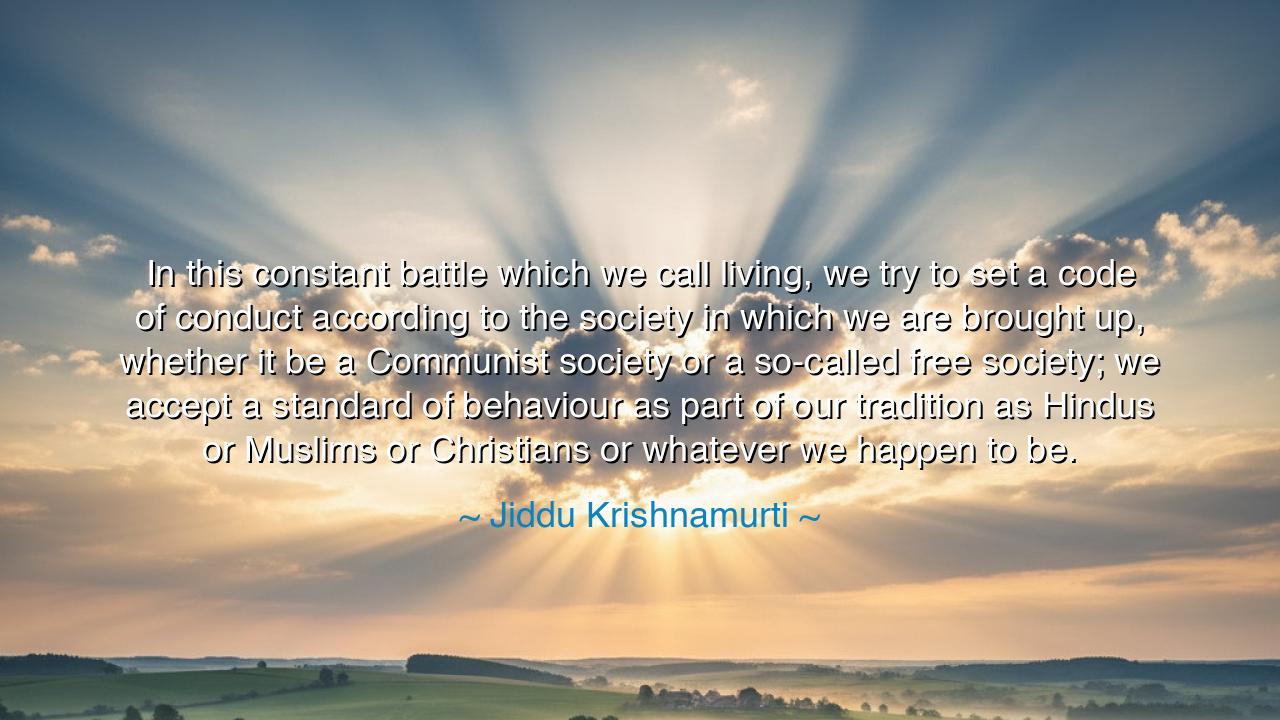
In this constant battle which we call living, we try to set a
In this constant battle which we call living, we try to set a code of conduct according to the society in which we are brought up, whether it be a Communist society or a so-called free society; we accept a standard of behaviour as part of our tradition as Hindus or Muslims or Christians or whatever we happen to be.






Jiddu Krishnamurti, the sage who walked beyond the boundaries of creed and nation, spoke with unflinching clarity when he declared: “In this constant battle which we call living, we try to set a code of conduct according to the society in which we are brought up, whether it be a Communist society or a so-called free society; we accept a standard of behaviour as part of our tradition as Hindus or Muslims or Christians, or whatever we happen to be.” In these words lies both a mirror and a warning. For Krishnamurti reminds us that much of what we call virtue or morality is not born of truth freely discovered, but of habit, conditioning, and the weight of inherited structures.
He calls life a battle, not because he glorifies strife, but because to live is to wrestle daily with conformity, fear, and the longing for security. From our first breath, we are shaped by the society that surrounds us. If it is ruled by Communism, we learn one code; if it is called free, we learn another. Each claims its authority, each demands allegiance, and few dare to ask: is this code truly born of wisdom, or is it merely tradition repeating itself? Here lies Krishnamurti’s power—he unveils that our supposed freedom is often a cage built by invisible hands.
Consider the example of the Soviet Union. For decades, citizens lived under a rigid code of conduct, told what to believe, how to act, and whom to trust. To question was to invite punishment. And yet, in so-called free societies, where the banner of liberty flies, people often fall into the same trap, following unspoken laws of culture, fashion, and politics without pausing to reflect. In both cases, men and women lived not as seekers of truth, but as prisoners of tradition. The difference is of form, not essence. This is Krishnamurti’s revelation: that whether under the red star or under the banner of freedom, the mind can still be enslaved.
But he does not leave us in despair. Rather, he urges us to awaken to this fact. The true battle is not against society, nor against one religion or another—it is against our own blindness. To accept uncritically the standards of behaviour handed down to us is to live half-asleep, repeating what others have said, believing what others have believed, while the flame of inquiry within us grows dim. The ancients taught that “the unexamined life is not worth living.” Krishnamurti gives this teaching new voice, showing us that only by seeing our conditioning can we step beyond it.
Think of the Buddha, who was born into the rigid traditions of his time. As a prince, he was given a code of conduct befitting nobility. As a Hindu of his age, he was taught the rituals and hierarchies of caste. Yet he looked upon suffering—the sickness, the old age, the death—and he saw that none of these traditions freed man from sorrow. So he left them behind, seeking truth not in conformity, but in direct experience. In this he embodies the very lesson Krishnamurti would later speak: that to live truly, one must question, one must look beyond the banners of society and religion, and seek a freedom untouched by conditioning.
For us, the teaching is both a challenge and a gift. The challenge: to recognize that much of what we believe is not our own, but borrowed. The gift: that we have the power to look freshly, to ask questions without fear, to live without clinging to false securities. To be Hindu, Muslim, Christian, Communist, or free-born is not in itself truth—it is only a path of tradition. Truth, as Krishnamurti tells us, lies beyond all labels.
So, my friend, what should you do? Do not reject society in bitterness, nor despise religion in arrogance. Instead, see them for what they are: structures created by human hands. Respect them if they serve wisdom, but do not be enslaved by them. Cultivate a mind that questions, a heart that listens, and a spirit that dares to walk beyond the familiar road. In this way, you honor not tradition for its own sake, but truth for its eternal sake.
Thus, let Krishnamurti’s words echo through your days: life is a battle, but the victory is not over others—it is over ignorance. Do not let society’s standards bind your soul. Seek truth as your only guide, and you shall live not as a shadow of tradition, but as a flame of freedom, burning clear in the endless night.






AAdministratorAdministrator
Welcome, honored guests. Please leave a comment, we will respond soon